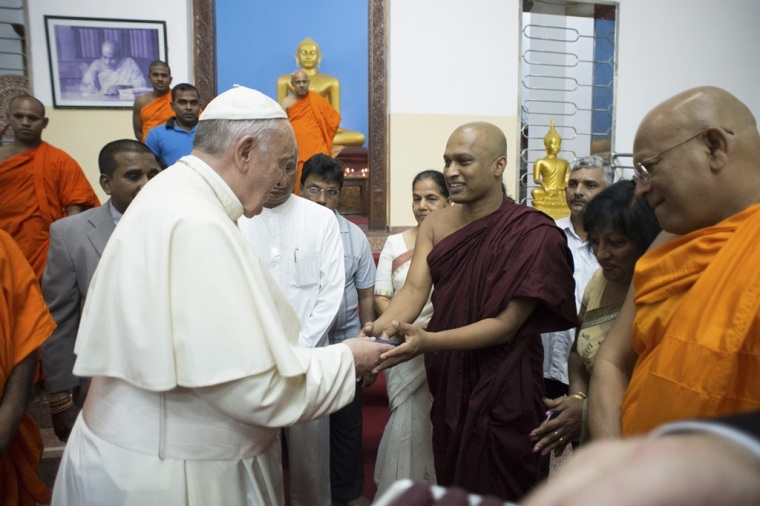Pope Francis Urges Sri Lanka: Pursue Truth to Heal the Wounds of War

It was the first time that the leader of the Roman Catholic Church visited a predominantly Hindu nation after two decades.
At the start of his week-long tour of Asia, Pope Francis told Catholic believers in Sri Lanka to pursue the truth if they want to end a quarter-century of injustice caused by a civil war.
"The process of healing also needs to include the pursuit of truth. All members of society must work together; all must have a voice," Pope Francis said.
"All must be free to express their concerns, their needs, their aspirations and their fears," he added in a speech delivered upon his arrival at Colombo's international airport on Tuesday.
The Pope called on Sri Lankans to uncover the truth about the civil war, which ended with the army's crushing defeat of Tamil rebels.
A United Nations estimate placed the death toll in the war at 100,000 before it ended in 2009.
A week after Sri Lankan voters booted out of power a wartime leader, the Pontiff denounced the evil conflict that tore the heart of Sri Lanka in a prayer that he said at the Church of Our Lady of Madhu.
"May all people here find inspiration and strength to build a future of reconciliation, justice and peace for all the children of this beloved land," the Pope said slowly in English.
In his visit, Francis also gave Sri Lanka its first saint, 17th century missionary Joseph Vaz, who he described as a model of reconciliation after the war.
He said Vaz was an example of religious tolerance relevant to Sri Lanka today as it recovers from the war between mainly Buddhist Sinhalese and Hindu Tamils.
Vaz was born in India's Goa, which was a Portuguese colony in 1651. After hearing about the persecution of Catholics by the Dutch, he traveled south by dressing as a beggar before working for years under the protection of a Buddhist king.
By the time of his death, the Church says he had almost single-handedly re-established Catholicism in Sri Lanka.
Catholics make up about 7 percent of Sri Lanka's 20 million population, while 10 times as many people follow Buddhism. About 10 percent of the population follow Islam, Reuters reported.
The Muslims face rising attacks from Buddhist extremists under the government of former President Mahinda Rajapaka, who lost office last week.
 Christians don't have to affirm transgenderism, but they can’t express that view at work: tribunal
Christians don't have to affirm transgenderism, but they can’t express that view at work: tribunal Archaeology discovery: Medieval Christian prayer beads found on Holy Island
Archaeology discovery: Medieval Christian prayer beads found on Holy Island Presbyterian Church in America votes to leave National Association of Evangelicals
Presbyterian Church in America votes to leave National Association of Evangelicals Over 50 killed in 'vile and satanic' attack at Nigerian church on Pentecost Sunday
Over 50 killed in 'vile and satanic' attack at Nigerian church on Pentecost Sunday Ukrainian Orthodox Church severs ties with Moscow over Patriarch Kirill's support for Putin's war
Ukrainian Orthodox Church severs ties with Moscow over Patriarch Kirill's support for Putin's war Islamic State kills 20 Nigerian Christians as revenge for US airstrike
Islamic State kills 20 Nigerian Christians as revenge for US airstrike Man who served 33 years in prison for murder leads inmates to Christ
Man who served 33 years in prison for murder leads inmates to Christ


 Nigerian student beaten to death, body burned over ‘blasphemous’ WhatsApp message
Nigerian student beaten to death, body burned over ‘blasphemous’ WhatsApp message 'A new low': World reacts after Hong Kong arrests 90-year-old Cardinal Joseph Zen
'A new low': World reacts after Hong Kong arrests 90-year-old Cardinal Joseph Zen Iran sentences Christian man to 10 years in prison for hosting house church worship gathering
Iran sentences Christian man to 10 years in prison for hosting house church worship gathering French Guyana: Pastor shot dead, church set on fire after meeting delegation of Evangelicals
French Guyana: Pastor shot dead, church set on fire after meeting delegation of Evangelicals ‘Talking Jesus’ report finds only 6% of UK adults identify as practicing Christians
‘Talking Jesus’ report finds only 6% of UK adults identify as practicing Christians Mission Eurasia ministry center blown up in Ukraine, hundreds of Bibles destroyed: 'God will provide'
Mission Eurasia ministry center blown up in Ukraine, hundreds of Bibles destroyed: 'God will provide' Church holds service for first time after ISIS desecrated it 8 years ago
Church holds service for first time after ISIS desecrated it 8 years ago Burger King apologizes for 'offensive campaign' using Jesus' words at the Last Supper
Burger King apologizes for 'offensive campaign' using Jesus' words at the Last Supper Uganda: Muslims abduct teacher, burn him inside mosque for praying in Christ’s name
Uganda: Muslims abduct teacher, burn him inside mosque for praying in Christ’s name